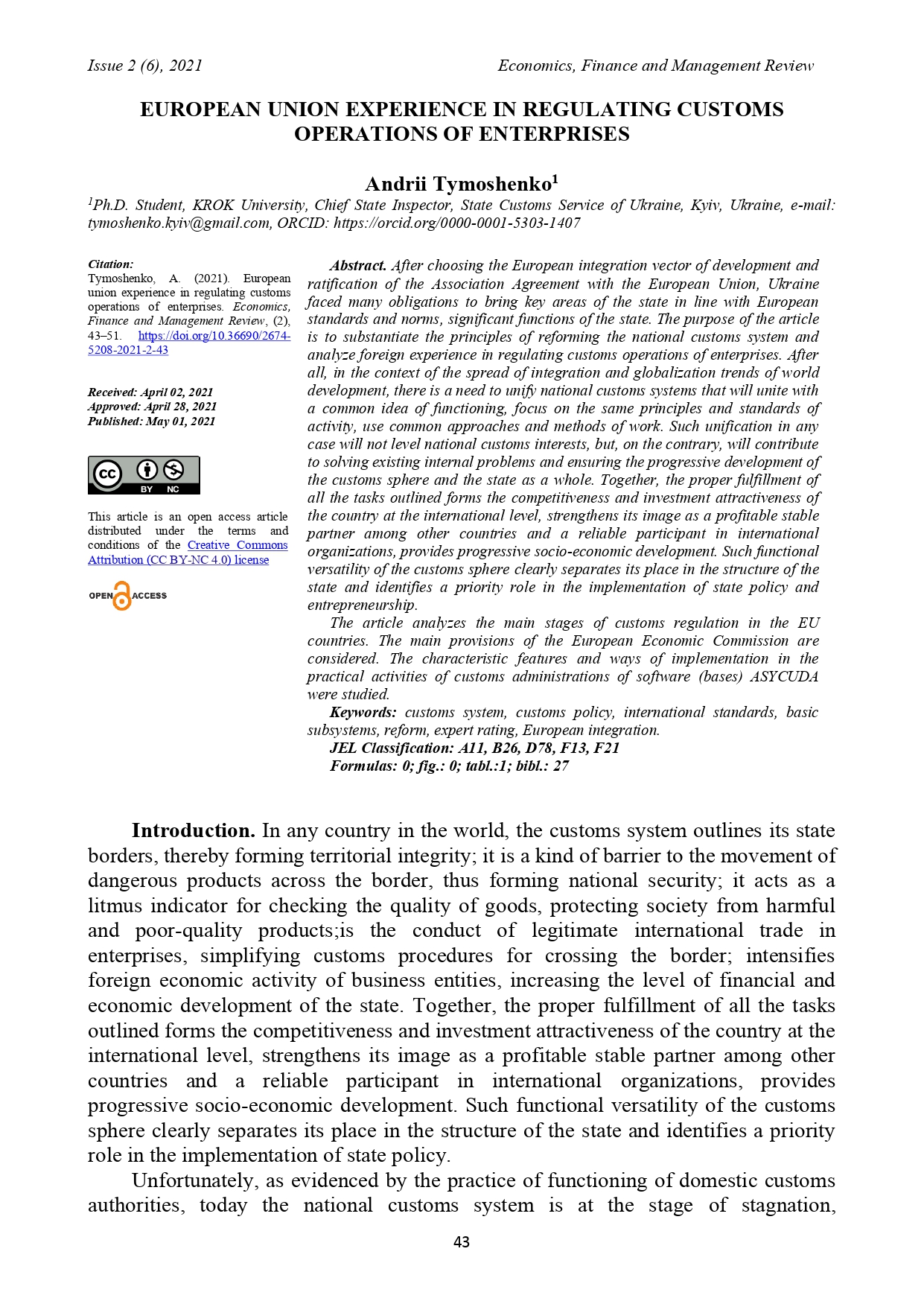EUROPEAN UNION EXPERIENCE IN REGULATING CUSTOMS OPERATIONS OF ENTERPRISES
DOI:
https://doi.org/10.36690/2674-5208-2021-2-43Keywords:
customs system, customs policy, international standards, basic subsystems, reform, expert rating, European integrationAbstract
After choosing the European integration vector of development and ratification of the Association Agreement with the European Union, Ukraine faced many obligations to bring key areas of the state in line with European standards and norms.significant functions of the state. The purpose of the article is to substantiate the principles of reforming the national customs system and analyze foreign experience in regulating customs operations of enterprises. After all, in the context of the spread of integration and globalization trends of world development, there is a need to unify national customs systems that will unite with a common idea of functioning, focus on the same principles and standards of activity, use common approaches and methods of work. Such unification in any case will not level national customs interests, but, on the contrary, will contribute to solving existing internal problems and ensuring the progressive development of the customs sphere and the state as a whole. Together, the proper fulfillment of all the tasks outlined forms the competitiveness and investment attractiveness of the country at the international level, strengthens its image as a profitable stable partner among other countries and a reliable participant in international organizations, provides progressive socio-economic development. Such functional versatility of the customs sphere clearly separates its place in the structure of the state and identifies a priority role in the implementation of state policy and entrepreneurship.
The article analyzes the main stages of customs regulation in the EU countries. The main provisions of the European Economic Commission are considered. The characteristic features and ways of implementation in the practical activities of customs administrations of software (bases) ASYCUDA were studied.
Downloads
References
Kivalov, S. V. and Kormych, B.A. (2001), Mytna polityka Ukrainy [Customs policy of Ukraine], Yurydychna literature, Odessa, 254 p.
Customs Code EU, retrieved from : https://zakon.rada.gov.ua/laws/show/ru/984_009-13#Text.
Bilukha, M. and Mykytenko, T. (2014), “Customs control: organization and methodology”, Naukovyi visnyk Natsionalnoho universytetu DPS Ukrainy (ekonomika, pravo), № 1 (64), pp. 181–187.
Berezhniuk, I. H. (2009), Mytne rehuliuvannia Ukrainy: natsionalni ta mizhnarodni aspekty [Customs regulation of Ukraine: national and international aspects], Akademiia mytnoi sluzhby Ukrainy, Dnipropetrovsk, Uktaine, 543 p.
Dudar, S. K. (2002), “Harmonization of legislation: problems of concept definition”, Derzhava i pravo. Yurydychni i politychni nauky, vol. 17, p. 11-16.
Hodovanets, O. and Vedashenko, N. (2014), “Customs control in Ukraine: essence and purpose”, retrieved from : http://sophus.at.ua/publ/2014_11_25_lviv/sekcija_4_2014_11_25/mitnij_kontrol_v_ukrajini_ sutnisti_priznachennja/70-1-0-1088.
Krysovata, K. (2013), “Financial risks in the system of customs control and customs clearance of goods”, Visnyk sotsialno-ekonomichnykh doslidzhen, vol. 2 (49), part 2, pp. 47–52.
Dodin, Ye. V. (2004), “Legal bases of customs business in Ukraine”, Mytna sprava, № 5, pp. 6–18.
Merezhko, O. O. and Nelip, M. I. (1999), Pravove rehuliuvannia svitovoi torhivli v systemi HATT/SOT [Legal regulation of world trade in the GATT / SOT system], Naukova dumka, Kyiv, Ukraine, 103 p.
Lazurenko, V. O. (2021), “Simplification of customs procedures - prospects for the state and business”, retrieved from : http://dspace.snu.edu.ua:8080/jspui/bitstream/123456789/2331/1/Lasu-renko.pdf.
Ruda, T. (2021), “The essence and significance of customs services in the context of customs reform in Ukraine”, retrieved from : http:// naukajournal.org/index.php/ naukajournal/article/viewFile/ 85/114.
Honcharuk, O. A. (2010), “Administrative and legal bases of reforming modern customs bodies of Ukraine”, Uchenyie zapiski Tavricheskogo natsionalnogo universiteta im. V. I. Vernadskogo. Seriya «Yuridicheskie nauki», part 23 (62), № 2, pp. 124–130, retrieved from : http://sn-jurid.crimea.ua/arhiv/2010/uch_23_2law/017_goncharuk.pdf.
Desiatniuk, O. and Kharkavyi, M. (2021), “The latest paradigm of customs control in terms of simplification of customs procedures”, Efektyvna ekonomika, retrieved from : http://www.m.nayka.com.ua/?op= 1&j=efektyvna-ekonomika&s=ua&z=3857.
Ivashchuk, I. (2010), “Directions and prospects of convergence of customs relations in the global space”, Halytskyi ekonomichnyi visnyk, № 4 (29), pp. 24–30.
Chubariev, V. L. (2009), Mizhnarodne ekonomichne pravo [International economic law], Yurinkom Inter, Kyiv, Ukraine, 368 p.
Valuieva, L. and Kovban, A. (2015), “Legal regulation of customs procedures on maritime transport”, Pravo i suspilstvo, № 4, part 3, pp. 139–144.
Averochkina, T. V. (2015), “Customs administrative jurisdiction of Ukraine in coastal seas”, Mytna sprava, № 5 (95), pp. 19–29.
Bazyliuk, I. O. (2011), “The concept of movement of goods across the customs border and its legal support”, Aktualni problemy derzhavy ta prava, vol. 60, pp. 516–522.
Luts, L. (2004), “Legal integration: general theoretical characteristics”, Visnyk Lvivskoho universytetu. Seriia: Yurydychna, vol. 39, pp. 79–86.
Moroz, B. I. and Diachenko, O. O. (2014), “Development of an automated customs control system for maritime transport”, Sistemnyie tehnologii, № 5 (94), pp. 55–64.
Perepolkin, S. M. (2008), Mizhnarodno-pravovi aspekty mytnoho spivrobitnytstva yevropeiskykh derzhav [International legal aspects of customs cooperation of European states], Akademiia mytnoi sluzhby Ukrainy, Dnipropetrovsk, Uktaine, 180 p.
Letter from the Ministry of Finance of Ukraine from 17.09.2015 № 31-03040-05-15/29409, retrieved from : https://www.mdoffice.com.ua/ua/aMDOSForum.GetANS?p_id=1343469.
Tsalina, D. S. (2004), “Concepts and principles of customs clearance”, Problemy zakonnosti, №69, pp. 110–114.
Nahrebelnyi, V. P. (2021), “Harmonization of legislation”, retrieved from : http://zakony.com.ua/juridical.html?catid=37171.
Fedyniak, H. S. and Fedyniak, L. S. (2000), Mizhnarodne pryvatne pravo [International private law], Yurinkom Inter, Kyiv, Ukraine, 416 p.
The ASYCUDA Programme. Unated Nations Conserence of Trade and Development, retrived from : http://www.asycuda.org/ programme.asp.
Holomovzyi, V. M. Pankova, L. A. Hryhoriev O. Yu. and other (2004), Mytne rehuliuvannia [Customs regulation], Natsionalnyi universytet «Lvivska politekhnika», Lviv, Ukraine, 240 p.

Downloads
Published
How to Cite
Issue
Section
License

This work is licensed under a Creative Commons Attribution-NonCommercial 4.0 International License.








